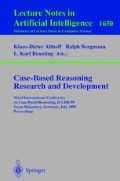Abstract
The adaptation step is central in case-based reasoning (CBR), because it conditions the obtaining of a solution to a problem. This step is difficult from the knowledge acquisition and engineering points of view. We propose a knowledge level analysis of the adaptation step in CBR using the reasoning task concept. Our proposal is based on the study of several CBR systems for complex applications which imply the adaptation task. Three of them are presented to illustrate our analysis. We sketch from this study a generic model of the adaptation process using the task concept. This model is in conformity with other CBR formal models.
Access this chapter
Tax calculation will be finalised at checkout
Purchases are for personal use only
Preview
Unable to display preview. Download preview PDF.
References
Aamodt, A. and Plaza, E. (1994). Case-Based Reasoning: Foundational Issues, Methodological Variations, and System Approaches. AI Communications, 7(1):39–58.
Armengol, E. and Plaza, E. (1994). A Knowledge Level Model of Case-Based Reasoning. In Richter, M.M., Wess, S., Althoff, K.-D., and Maurer, F., editors, First European Workshop on Case-Based Reasoning-EWCBR-93, pages 53–64, University of Kayserslautern, Germany. LNAI, vol. 837, Springer Verlag, Berlin.
Bergmann, R. and Wilke, W. (1995). Building and refining abstract planning cases by change of representation language. Journal of Artificial Intelligence Research, 3:53–118.
Fuchs, B. (1997). Représentation des connaissances pour le raisonnement à partir de cas: le système ROCADE. Thèse d’université, Université Jean Monnet, Saint-Etienne, France.
Fuchs, B., Mille, A., and Chiron, B. (1995). Operator Decision aiding by Adaptation of Supervision Strategies. In Veloso, M. and Aamodt, A., editors, First International Conference on Case-Based Reasoning-ICCBR-95, pages 23–32, Sesimbra, Portugal. LNAI, vol. 1010, Springer Verlag, Berlin.
Goel, A. (1996). Meta cases: Explaining case-based reasoning. In Smith, I. and Faltings, B., editors, Third European Workshop on Case-Based Reasoning-EWCBR-96, pages 150–163, Lausanne, Suisse. LNAI, vol. 1168, Springer Verlag, Berlin.
Hanks, S. and Weld, D.S.(1995). A domain independant algorithm for plan adaptation. Journal of Artificial Intelligence Research, 2:319–360.
Hua, K., Faltings, B., and Smith, I. (1996). CADRE: Case Based Geometric Design. Artificial Intelligence in Engineering, 10:171–183.
Hua, K., Smith, I., and Faltings, B. (1993). Exploring case-based design: CADRE. Artificial Intelligence for Engineering Design, Analysis and Manufacturing (AI EDAM), 7(2):135–144.
Koehler, J. (1996). Planning from Second Principles. Artificial Intelligence, 87:145–186.
Leake, D., Kinley, A., and Wilson, D. (1997). Learning to integrate multiple knowledge sources for case-based reasoning. In Proceedings of the 15th International Joint Conference on Artificial Intelligence. Morgan Kaufmann.
Lieber, J. (1997). FrRaisonnement à partir de cas et classification hiérarchique. Application à la planification de synthèse en chimie organique. Thèse d’université,UniversitéHenri Poincaré Nancy 1, Nancy, France.
Lieber, J. and Napoli, A. (1996). Adaptation of Synthesis Plans in Organic Chemistry. In Workshop on Adaptation in Case-Based Reasoning, ECAI-96, pages 18–21, Budapest, Hungary.
Maher, M.L., Balachandran, M.B., and Zhang, D.M.(1995). Case-Based Design. Lawrence Erlbaum Associates, Mahwah, New Jersey.
Mille, A. (1995). Raisonnement basésur l’expérience pour coopérer à la prise de décision, un nouveau paradigme en supervision industrielle. Thèsed’université,Université Jean Monnet, Saint-Etienne.
Smyth, B. (1996). Case-Based Design. Doctoral thesis of the Trinity College, Dublin.
Voß, A., editor (1996). Proceedings of the ECAI’96 Workshop: Adaptation in Case-Based Reasoning.
Voß, A. (1997). Case Reusing Systems-Survey, Framework and Guidelines. Knowledge Engineering Review, 12(1):59–89.
Author information
Authors and Affiliations
Editor information
Editors and Affiliations
Rights and permissions
Copyright information
© 1999 Springer-Verlag Berlin Heidelberg
About this paper
Cite this paper
Fuchs, B., Mille, A. (1999). A Knowledge-level Task Model of Adaptation in Case-Based Reasoning. In: Althoff, KD., Bergmann, R., Branting, L. (eds) Case-Based Reasoning Research and Development. ICCBR 1999. Lecture Notes in Computer Science, vol 1650. Springer, Berlin, Heidelberg. https://doi.org/10.1007/3-540-48508-2_9
Download citation
DOI: https://doi.org/10.1007/3-540-48508-2_9
Published:
Publisher Name: Springer, Berlin, Heidelberg
Print ISBN: 978-3-540-66237-2
Online ISBN: 978-3-540-48508-7
eBook Packages: Springer Book Archive

